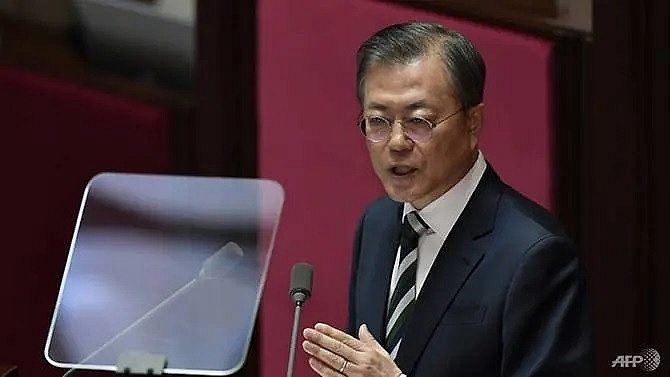South Korea's Moon ups defence spending, urges North to talk
 |
| South Korea will increase its defence spending by 7 per cent next year. (Photo: AFP/Jung Yeon-je) |
Contact between North and South Korea stalled after the collapse of a February summit between North Korean leader Kim Jong Un and US President Donald Trump in Hanoi.
Since then Pyongyang has excoriated its neighbour over joint military drills with the US, and the acquisition of American fighter jets.
It is a far cry from the cross-border warmth of last year, when Moon seized on the Pyeongchang Winter Olympics to broker the North-South discussion process and held three summits himself with Kim.
South Korea will increase defence spending by 7 per cent to more than 50 trillion won (US$42 billion) next year, Moon told parliament, emphasising that "strong defence" was crucial for "self-determination".
"We will strengthen the core defence system by boosting assets such as next-generation submarines and surveillance satellites."
The announcement came after North Korea this month tested what it said was a submarine-launched ballistic missile that marked a "new phase" in its capabilities - the most provocative in a series of weapons tests it resumed after an 18-month hiatus.
North Korea is under multiple sets of UN sanctions over its nuclear and missile programmes.
Pyongyang and Washington restarted working-level talks in Sweden this month only for them to quickly break down, with the North blaming the US for not giving up its "old attitude" and setting the end of this year as deadline for Washington to change its stance.
It has also said it has nothing more to talk about with Seoul, and condemned joint South Korea-US drills and the deployment of F-35A fighter jets in the South as rehearsals for invasion and violations of Seoul-Pyongyang agreements.
But Moon - who has long championed engagement with Pyongyang - held out hope for a breakthrough despite the setbacks, claiming that the deadlocked talks were the "last hurdle" before denuclearisation.
A "bright future" for the North would only be possible on the basis of a "peace economy" driven by inter-Korean economic projects, he said. "I urge the North to respond."
What the stars mean:
★ Poor ★ ★ Promising ★★★ Good ★★★★ Very good ★★★★★ Exceptional
Related Contents
Latest News
More News
- Russian President congratulates Vietnamese Party leader during phone talks (January 25, 2026 | 09:58)
- Worldwide congratulations underscore confidence in Vietnam’s 14th Party Congress (January 23, 2026 | 09:02)
- Political parties, organisations, int’l friends send congratulations to 14th National Party Congress (January 22, 2026 | 09:33)
- 14th National Party Congress: Japanese media highlight Vietnam’s growth targets (January 21, 2026 | 09:46)
- 14th National Party Congress: Driving force for Vietnam to continue renewal, innovation, breakthroughs (January 21, 2026 | 09:42)
- Vietnam remains spiritual support for progressive forces: Colombian party leader (January 21, 2026 | 08:00)
- Int'l media provides large coverage of 14th National Party Congress's first working day (January 20, 2026 | 09:09)
- Vietnamese firms win top honours at ASEAN Digital Awards (January 16, 2026 | 16:45)
- ASEAN Digital Ministers' Meeting opens in Hanoi (January 15, 2026 | 15:33)
- ASEAN economies move up the global chip value chain (December 09, 2025 | 13:32)

 Tag:
Tag:




















 Mobile Version
Mobile Version